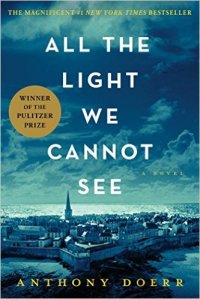I’m a sucker for WWII books. Especially those that tell the experiences from voices from  whom we often don’t hear. Anthony Doerr took on this challenge in All the Light We Cannot See. I ended up having a love-hate relationship with this tome. It still bothers me a week after I finished it. I really, really wanted to put it on my top ten list.
whom we often don’t hear. Anthony Doerr took on this challenge in All the Light We Cannot See. I ended up having a love-hate relationship with this tome. It still bothers me a week after I finished it. I really, really wanted to put it on my top ten list.
For starters, I think Doerr did an amazing job of conveying the idea of “light” as a metaphor for perception. He works it in gently. Just enough reminders so that we don’t forget it’s there, but not so forceful it taints the other parts of the book. Specifically, there’s a blind girl, Marie-Laure, and one that’s sighted, Werner. The novel alternates between their lives, one in France, the other in Germany. As the novel progresses, it becomes clear that while Marie-Laure does not see in the conventional sense, she’s very aware of the world around her. Not just the physical world either. She’s perceptive of the conflicts and challenges that she’s finds thrust into her world as Europe descends into the chaos of WWII. While she can’t always explain why these problems get in her way, she finds ways to maneuver around them.
Werner on the other hand, he frustrates me to no end. On the one hand I understand him, because he buys into the Nazi promise to make him better than the son of miners, particularly when they find his hidden talent. However, I began to question the reliability of his perception. There were comments that he makes that made me feel like he wants my sympathy or forgiveness, but without disclosing the full details of what happened that I should forgive him. Then I wondered if maybe it wasn’t Werner, but Doerr. Is Werner really that naive? Imperceptive? Tricksy? Or is Doerr too heavy-handed in keeping Werner and the readers “in the dark”. I haven’t been able to answer that question. And it keeps me from really liking the book.
What finally broke me was the ending. It was so well done and beautiful in its purpose and resolution. But Doerr goes one step too far. He added one last scene that left me with a bad aftertaste. So, dear reader, do I let a several annoying apples taint the barrel? Annoyances aside, I highly recommend this book for the beautiful, sharp writing. It’s an experience at least.
